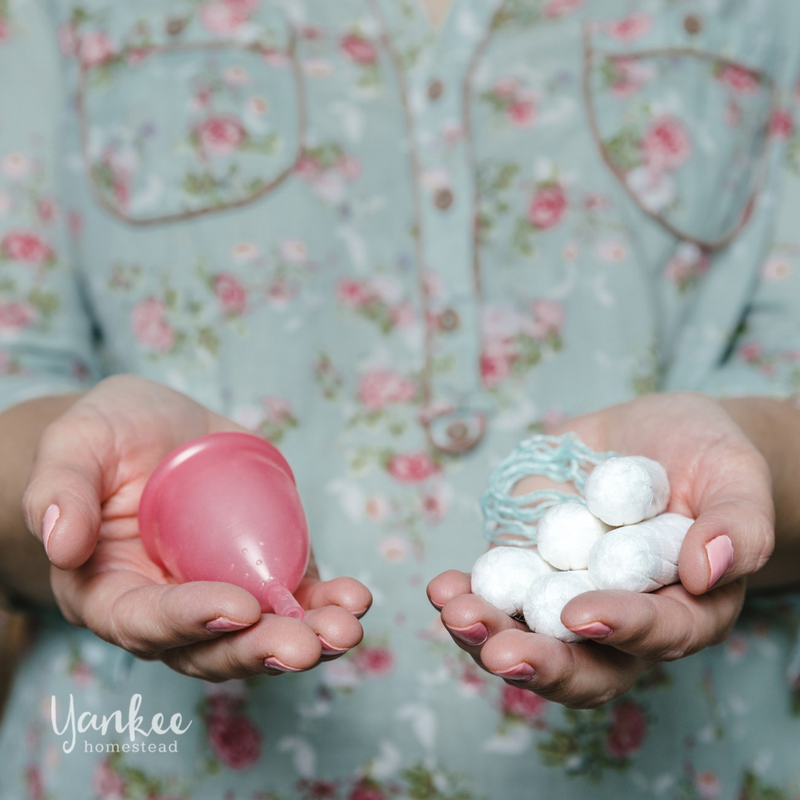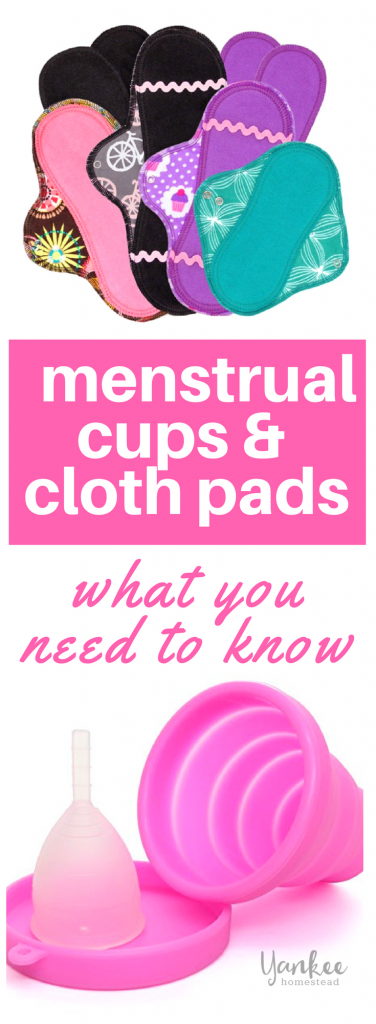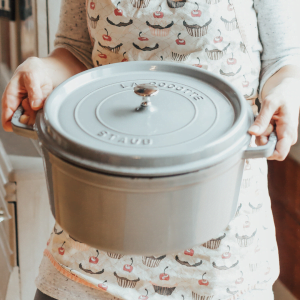Natural Alternatives to Disposable Feminine Products

This post may contain affiliate links, which means I make a small commission at no extra cost to you.
See my full disclosure here.
It’s hard to believe it’s been several years since I started using natural alternatives to disposable feminine products. You know what they say…time flies when you’re having fun!
Getting Started With Menstrual Cups and Cloth Pads
If you’re new to the whole idea of natural alternatives to disposable feminine products, you might want to start here…
- I Got a Diva Cup for Christmas – 7 things I love about using a menstrual cup plus 4 tips for getting started.
- How to Insert the Diva Cup Perfectly Every Time – After a terrible leak on an out of town trip (yikes!), I vowed to figure out the secret to inserting the Diva cup perfectly every time. And I did! This trick works like a charm.
- Reusable Cloth Pads – How I got started with reusable cloth pads, and the brands I tried.
I’m Sold
For all those “land the plane” types out there, here’s the nutshell version of what I’ve learned…
- I’m totally converted. Never going back to toxic, uncomfortable, wasteful, expensive, disposable feminine products!
- I have a favorite brand of reusable cloth pads. It’s called Lunapads. I tried a bunch of brands for several years and Lunapads outperformed them all. Highly recommend!
- The Diva Cup rocks. Love it! Yes, there’s a learning curve, but it’s totally worth it. I’ve used the same $30 cup for more than two years, washing only with hot water.
Why Use Natural Alternatives to Disposable Feminine Products?
For those who want more details, let’s talk about reasons for using natural alternatives to disposable feminine products…
1. Better health
Did you know that manufacturers are not required to disclose the materials used to produce tampons and disposable pads? Since pads and tampons are considered to be “medical devices”, they are regulated by the FDA and therefore excused from listing materials and ingredients.
From what we can tell, however, disposable feminine products contain harmful plastics and chemicals linked to hormone and endocrine system disruption, immune system suppression, and abnormal growths in the body (like cancer). Many products are bleached, which is another cause for concern.
2. Better earth
The average woman uses 9,600 tampons in her lifetime. (That’s 20 tampons per cycle for 40 years.) Multiply those 9,600 tampons by millions of women, and you get an unfathomable amount of flushed or tossed trash. Flushed tampons are not always filtered out of waste water and can end up in lakes and streams. In a landfill, disposable feminine products can leach harmful toxins into the soil and groundwater. This can and does affect the food we eat and the water we drink!
3. Better plumbing
Tampons are designed to expand, y’all. This is bad news for pipes! Tampax and Kotex both advise against flushing tampons because they can harm septic systems and cannot be processed by wastewater treatment facilities.
Ask any plumber, and he’ll tell you it’s true. We live in an older home its own private septic system and have payed our plumbers hundreds of dollars to unclog pipes blocked by tampons. Our plumbers confirmed that tampons are bad news for plumbing, and are often to blame for clogged pipes.
4. Better comfort
After wearing reusable pads and a Diva Cup for several years, I can’t believe how uncomfortable disposables feel. It’s like the difference between trying to sleep on a doctor’s exam table, stiff and covered with crisp paper, or snoozing in the comfy bed of a luxury hotel, with soft, cozy sheets.
5. Better value
Most women in the U.S. spend anywhere from about $100-$120 on disposable feminine products each year. (That’s roughly 8-9 boxes of tampons and 6-8 boxes of pads or liners per year, at about $7 per box.)
My own cost for a Diva Cup plus a generous supply of organic Lunapads came to $211. The Diva cup has lasted for two full years and is still going strong. I expect the pads to last at least five years with proper care.
Let’s say my current stash of cup + cloth pads lasts for five years. My annual cost would be $42. That’s less than half the cost of disposables! Even if the cup and pads lasted only three years, I would still come out ahead.
The Choice is Clear
For me, the choice is pretty clear. Menstrual cups and reusable cloth pads are better for my health, the environment, our plumbing, my own comfort, and my family’s budget. I’m so glad I switched to these natural alternatives to disposable feminine products!
What do you think? Have you tried a menstrual cup or reusable cloth pads? If not, what’s holding you back?


Sign up NOW for my best tips delivered weekly to your inbox!
You’ll also get instant access to my library of free ebooks and resources.










Leave a Comment